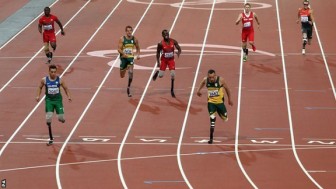LONDON, (Reuters) – South Africa’s ‘Blade Runner’ Oscar Pistorius has expressed regret over the timing of his outburst following his shock loss to Brazil’s Alan Oliveira in the 200 metres final at the London Paralympic Games on Sunday.
Moments after suffering his first 200m defeat in nine years, Pistorius complained that his opponent’s blades were too long as well as criticising rules that allowed athletes to make themselves artificially tall.
Paralympic organisers said yesterday they met with an “emotional” Pistorius shortly after the race and assured him his opponent’s blades had been measured and were within the limits set out prior to competition.
In a statement yesterday, the sprinter stuck to his claim that International Paralympic Committee (IPC) rules allowed athletes to have an artificially long stride length, but apologised for raising his concerns immediately afterwards.
“I want to apologise for the timing of my comments but I do believe that there is an issue here,” said the 25-year-old, who last month became the first double amputee to run in the Olympics and made the 400 metres semi-finals.

“I accept that raising these concerns immediately as I stepped off the track was wrong.
“That was Alan’s moment and I would like to put on record the respect I have for him.
“I am a proud Paralympian and believe in the fairness of sport. I am happy to work with the IPC who obviously share these aims.”
Paralympic organisers yesterday said Pistorius had raised concerns about another athlete’s blades six weeks ago as well as expressing concerns about IPC rules in the run up to the Games.
After their initial meeting on Sunday night, they promised to meet with him again to discuss the issues he raised.
“After the race Oscar was clearly upset and disappointed to have lost his first 200m race in nine years and requested a meeting,” the IPC’s director of communications Craig Spence said yesterday.
“Oscar is a proud Paralympian and a fantastic ambassador of the Paralympic movement. He has done more than any other athlete to raise our profile over the years so we were more than happy to listen to his concerns.
“We met with him and he shared his views, he was clearly very emotional so we agreed we would take his comments away and arrange a meeting at a later date in a less hostile environment than the cauldron of an Olympic stadium straight after a race.”
STUNNING
FIGHTBACK
Pistorius, who was defending his 100m, 200m and 400m titles, streaked into an early lead and was almost 10 metres ahead as the athletes came into the home straight but the Brazilian launched a stunning fightback.
Pistorius said that it was only his opponent’s stride length that allowed him to eat into the South African’s lead and surge to victory over the final few metres.
IPC rules governing the length of prosthetics are determined by a complicated formula that involves measuring from the chest to the amputated limb and the arm span.
This is converted into a height prediction and a maximal height is used to asses the length of prosthetics.
“When these formulas were developed they were discussed with athletes and coaches and feedback collected,” the IPC’s medical and scientific director Dr Peter van der Vliet said.
“We got notice that it was the best system in place and we could go with it.”
As Pistorius also competes against able-bodied athletes, his prosthetic blades have to satisfy the rules that govern non-Paralympic competition and, in his case, these regulations were decided after a ruling by the Court of Arbitration for Sport.
“Ultimately we have two governing bodies involved and it becomes quite a challenge to harmonise the rules in this regard,” Van der Vliet added.
“It is important that we do have our own set of technical rules that are independent of variation to rule changes in other governing bodies.”





